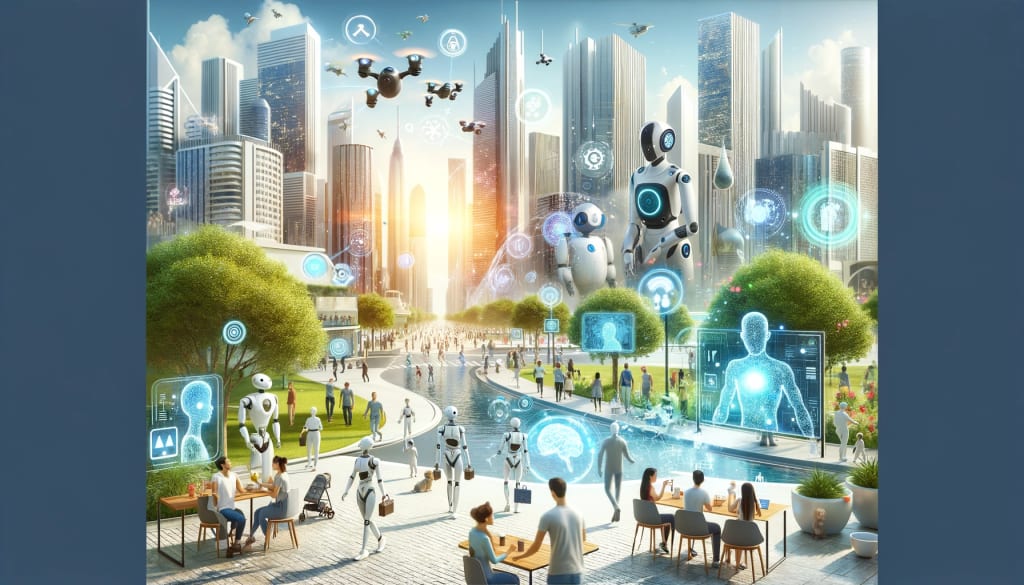AI Unveiled: Navigating the Promise and Peril of Tomorrow's Intelligent World
The Future of AI: Possibilities and Ethical Concerns

In the ever-evolving landscape of technology, artificial intelligence (AI) stands as a beacon of progress and innovation. Tracing its roots back to the mid-20th century, AI has journeyed from the realms of science fiction to an integral part of our daily lives. This monumental shift began with simple, rule-based algorithms and has evolved into complex systems capable of learning and adapting. Today, AI finds its way into various facets of our existence, from voice assistants in our smartphones to sophisticated data analysis tools in businesses.
CLICK HERE: TO GET THE BEST NATURAL HEALTH SUPPLEMENTS
The Bright Side: Unprecedented Possibilities of AI
AI’s ascent brings a multitude of benefits that were once deemed impossible. In various sectors, AI-driven tools are revolutionizing the way we work, enhancing efficiency, and opening doors to new possibilities.
In Healthcare: AI's role in healthcare is transformative. It offers faster, more accurate diagnoses and personalized treatment plans, tailoring healthcare to the individual rather than the mass. AI algorithms can analyze vast amounts of medical data, identifying patterns that might be missed by human eyes. This not only aids in early disease detection but also in the development of new treatments.
Environmental Sustainability: AI is also a crucial ally in our fight against environmental challenges. By analyzing climate data, AI can help predict and mitigate the effects of climate change. In renewable energy, AI optimizes the operation of wind and solar power plants, making clean energy more efficient and accessible.
CLICK HERE: TO KNOW THE BENEFITS OF RHODIOLA SUPPLEMENTS
The Flip Side: Ethical Dilemmas and Concerns
However, with great power comes great responsibility. The rise of AI is not without its ethical quandaries.
Job Displacement: One of the most pressing concerns is the impact of AI on employment. Automation and AI technologies are reshaping the job market, leading to fears of widespread job displacement. While AI creates new job opportunities, the transition for those in industries most affected by automation is a significant societal challenge.
Privacy Concerns: The increasing use of AI in surveillance and data analytics raises serious privacy concerns. The ability of AI systems to collect, analyze, and interpret vast amounts of personal data poses risks to individual privacy and autonomy.
CLICK HERE: TO FIND THE HEALTH BENEFIT OF SHILAJIT POWDER
Bias and Discrimination: Another critical issue is the potential for bias and discrimination in AI systems. Since AI algorithms are trained on data generated by humans, they can inadvertently learn and perpetuate existing biases, leading to unfair or harmful outcomes.
The Balancing Act: AI and Regulatory Frameworks
To navigate these challenges, establishing robust AI regulatory frameworks is essential. However, this is easier said than done. The dynamic and global nature of AI makes it difficult to create universal ethical guidelines and regulations.
Global Efforts: Despite these challenges, efforts are being made globally to set ethical standards for AI. These include guidelines for responsible AI development and use, focusing on transparency, fairness, and accountability.
Case Studies: Different countries have adopted varied approaches to AI regulation. For instance, the European Union’s General Data Protection Regulation (GDPR) includes provisions on automated decision-making and profiling, offering a model for others to follow.
AI and Human Interaction: A Delicate Dance
As AI becomes more integrated into our social fabric, the nature of AI-human interaction takes center stage. AI in social settings brings up questions about empathy, emotional intelligence, and the psychological impact of AI-human relationships.
CLICK HERE: TO KNOW THE BENEFITS OF RHODIOLA SUPPLEMENTS
Empathy and Emotional Intelligence: While AI can simulate human-like interactions, the depth of genuine empathy and emotional intelligence is still a subject of debate. How these technologies affect human behavior and social norms is a crucial area of study.
Psychological Impact: The psychological effects of AI companionship, especially in vulnerable populations, need careful consideration. While AI can offer support and companionship, it also raises concerns about dependency and the erosion of human-to-human connections.
Future Projections: Where Do We Go from Here?
Looking ahead, the trajectory of AI is both exciting and uncertain. Predictions for AI in the next decade range from groundbreaking advancements in machine learning to new ethical debates.
Predictions: Developments in areas like quantum computing could propel AI into new realms of capability. However, with these advancements come emerging ethical debates, particularly concerning AI autonomy and decision-making.
CLICK HERE: TO FIND THE HEALTH BENEFIT OF SHILAJIT POWDER
Societal Readiness: The pace of AI innovation often outstrips societal readiness and regulatory frameworks. This gap poses significant challenges as we try to harness the benefits of AI while safeguarding against its risks.
Our Role in Shaping AI's Future
The future of AI is not just in the hands of technologists and policymakers; it is also in ours. Public awareness and education about AI are vital.
Public Awareness: Understanding AI, its capabilities, and its limitations is crucial for society. This knowledge empowers individuals to make informed decisions about AI and its role in their lives.
CLICK HERE: TO FIND OUT THE BENEFITS OF KOJIC ACID
Responsible Development: Advocating for responsible AI development and usage is essential. This includes supporting policies and practices that prioritize ethical considerations in AI.
Individual Contribution: Individuals can contribute to ethical AI practices by staying informed, participating in public discourse, and holding companies and governments accountable for their use of AI.
Conclusion: Embracing AI with Cautious Optimism
In conclusion, AI represents a paradigm shift in our technological capabilities, offering immense potential benefits while posing significant ethical challenges. As we stand at this crossroads, it is crucial to embrace AI with cautious optimism. We must strive to find the delicate balance between harnessing AI's transformative power and ensuring it aligns with our ethical and societal values. The journey is ongoing, and each of us plays a role in shaping a future where AI is developed and used responsibly and beneficially.





Comments
There are no comments for this story
Be the first to respond and start the conversation.